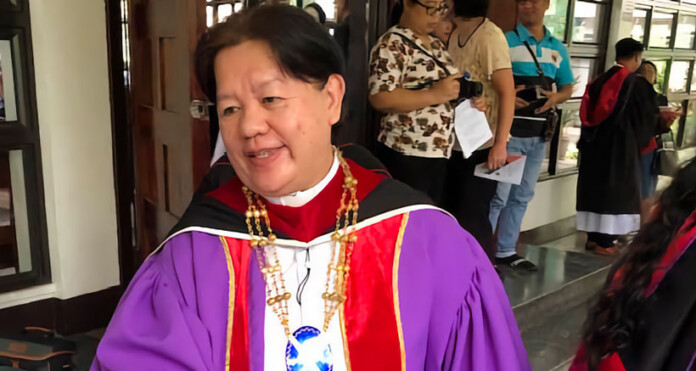Theological education and seminary preparedness are critical topics in the Anglican Communion. In the Asia-Pacific region, these conversations are juxtaposed with a healthy level of action.
While seminary enrollment is flattening at many schools, coinciding with the move to online education, St. Andrew’s Theological Seminary in Quezon City, Philippines, is booming through the leadership of the Very Rev. Gloria Mapangdol, dean and president.
St. Andrew’s is the national seminary of the Episcopal Church in the Philippines. It offers a bachelor’s degree in theology and a master’s degree in divinity, and is looking at launching doctoral programs.
Current efforts to enhance education focus on cross-regional seminary partnerships in the Asia-Pacific region, which helps bridge gaps in clergy leadership. A new St. Andrew’s program bridges distance to train seminarians from Myanmar, almost 1,700 miles away. This year St. Andrew’s welcomed four students from Myanmar and four from Bangladesh, 2,090 miles from the Philippines. Current enrollment is 300 men and women of varying ages, the dean said.
Mapangdol, dean for more than a decade, named a prevalent problem. “Language is an issue,” she said, and faculty teach in English to offset it.
She considers the internet both good and bad. “It’s a challenge, in that we really have to teach our students to be critical thinkers and writers. It is also a good thing with easy access.” Connecting online, however, can be an obstacle in the Philippines, where internet connections can be spotty, she said.
As with other higher-education institutions, the seminary’s online classes have accelerated since the pandemic. “That’s one of the things we got from COVID,” Mapangdol said. The seminary’s online programs offer a master’s degree in ministerial leadership (for clergy) and a certificate in ministerial leadership (for laity).
Mapangdol, the first woman to serve as dean, participated in an important 2023 conference with seminary officials from throughout the Asia-Pacific region, and is the network chair. “I don’t know why they chose me,” she laughed.
The group of 11, named the Anglican Seminary Deans Network Asia-Pacific, “is a new kind of organization,” she said. “We met once in person. The rest is online.” The next in-person gathering is slated for 2025.
“There were people from the Philippines, Japan, Korea, Hong Kong, meeting with the understanding that it would happen again,” she said.
“We met and listened to each speak about their context, their college and the province they represented,” the group’s report said. “We identified both common themes and challenges unique to each context.”
The report said there was “a general decline in numbers of ordinands, with the notable exception of St. Andrew’s in the Philippines.”
The report added, “Challenges included government accreditation for courses and access to government student support, and the cost of travel and visa requirements, especially in the island nations.”
Important shared concerns emerged: “Too few students, retiring faculty, physical plants,” the dean said, quoting from the report.
She and other seminary deans are looking at the needs of the church, such as trained clergy to fill the rolls left vacant by retirements and open teaching positions in Episcopal schools.
“We are expanding, we are growing in the church, and we need people trained to do the ministry,” she said.
The group promised further conversations. “There is a commitment, whether there is funding or no funding, that we need to learn from each other’s contexts and get in touch with each other,” she said. “We hope for exchanges because learning from each other’s contexts is very, very important.”



